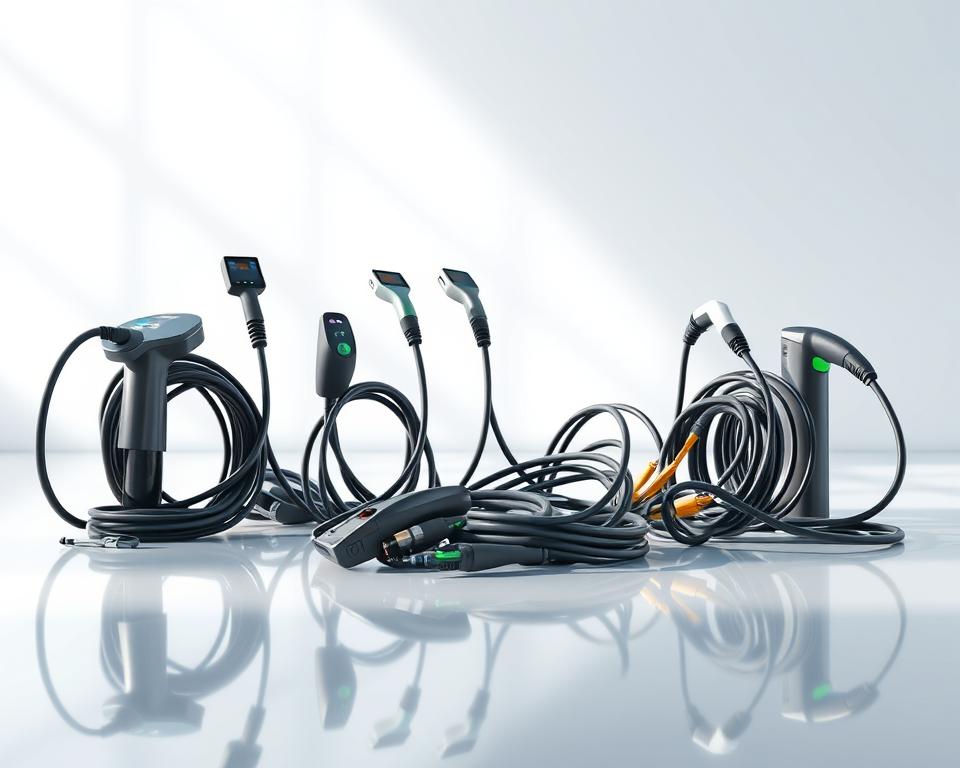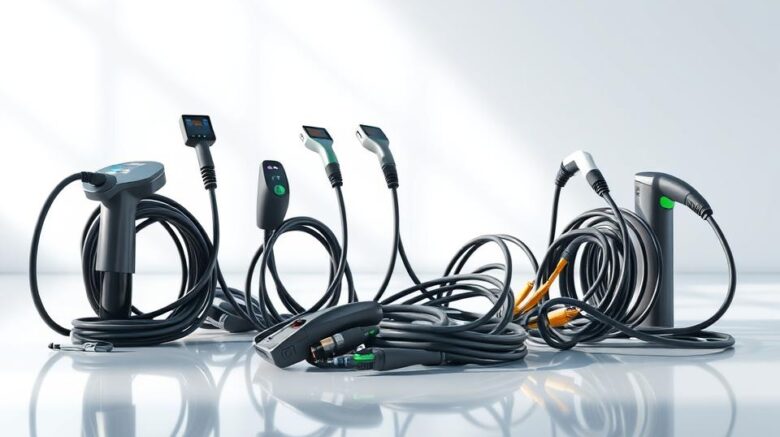Best EV Charging Cable Manufacturers for Your Electric Vehicle
The electric vehicle industry is on the rise, with the demand for trustworthy and high-performance charging solutions surging. Today, leading companies have been at the cutting edge of this change, providing top-tier charging infrastructure. Southwire, for instance, entered the market in 2014 and excels, garnering 1000+ five-star reviews and 75 years of experience in the electrical construction industry.
The surge in electric vehicle adoption drives demand for robust, rapid, and reliable EV Charger Manufacturers. Leading brands are innovating to address changing requirements, offering solutions that boost the overall charging experience.
Understanding the distinctions between various charging solutions matters for selecting wisely. Quality charging infrastructure directly influences vehicle performance and user experience.
Significant Points
- Top manufacturers offer high-quality charging cables for improved durability and safety.
- Growing EV adoption fuels demand for fast, reliable infrastructure.
- Leading companies innovate to meet the evolving needs of electric vehicle owners.
- Premium cables enhance both charge rate and vehicle function.
- Opting for top-tier cables yields future savings.

Why High-Quality EV Cables Matter
As electric vehicles become increasingly popular, the significance of high-quality EV charging cables cannot be overstated. The efficiency, security, and dependability of electric vehicle charging systems hinge upon the quality of the charging cables used.
Advancements in EV Charging
Electric vehicle charging technology has undergone significant advancements in recent years, with a priority on speedy charge times and enhanced protections. Today’s EV charging cables are built for these requirements, incorporating high-grade materials and advanced designs to minimize energy waste and maximize charging efficiency.
The Case for Premium Charging Infrastructure
Quality charging cables directly impact the overall performance and safety of EV charging infrastructure. Durable features, such as all-weather performance and temperature tolerance, ensure reliable operation across various environments. Moreover, meeting standards and adherence to industry guidelines are crucial in guaranteeing safe operation.
| Key Features | Benefits |
|---|---|
| High-grade build quality | Minimized power loss during energy transfer |
| Robust durability | Weather resistance, flexibility in extreme temperatures |
| Regulatory compliance | Certified safety |
| Maintainability | Long-term value proposition, reduced waste |
Products from Aichie Tech Electronics pass The Cable Lab’s stringent tests. With repairable Portable EV Charger, repairable designs reduce lifetime costs, reducing waste and protecting the planet.
Premier Chinese EV Cable Suppliers
A surge of cable makers in China supports the EV boom. They play a key role in global EV infrastructure, offering premium charging cables designed for various charging needs.
Wottz – Top EV Cable Maker from 2014
Wottz has been a leading cable manufacturer since 2014. They offer a range of cables that meet the specific requirements of EV charging systems, from Mode 1, 2, 3, and fast-charging Mode 4 DC Charging.
Aichie Tech Electronics – 75 Years in Electrical Solutions
With over 75 years of experience in electrical solutions, Aichie Tech Electronics brings significant expertise to the EV charging cable market. Their products are designed to meet the demands of both domestic and commercial EV charging infrastructure.
Other Notable Manufacturers in the Market
Companies developing flexible, weather-resistant and high-performance cables are also notable. These include Type 1 & 2 connector experts, as well as companies developing cables with enhanced flexibility and resistance to environmental factors.
Types of EV Charging Cables Explained
As electric vehicles become increasingly popular, understanding the various types of EV Charging Cable Manufacturers is crucial for optimal charging experiences. Different cables suit different charging needs. The diversity in EV charging infrastructure necessitates a closer look at the different cable types available.
Comparing SAE J1772 and Mennekes Cables
Type1 and Type2 charging cables are two common standards used for EV charging. Type 1, also known as SAE J1772, is predominantly used in North America, while Type 2, or Mennekes, is the European norm. The right cable matches your car and charger. Type 2 cables often support higher charging capacities, making them suitable for faster charging.
AC Level2 vs DC Fast Charging
Level2 charging cables offer faster charging than Level1, using 240V AC power to deliver up to 19.2 kW of power. DC Fast Charging cables, on the other hand, enable quick top-ups by on-site AC→DC conversion, delivering rapid fill-ups. These cables are essential for long-distance EV travel, letting EVs charge in minutes.
Portable vs Fixed Cables
Granny chargers plug into home outlets for emergency use. Tethered cables are attached permanently, offering ease at the cost of portability. The choice comes down to flexibility vs convenience.
When selecting an EV charging cable, factors such as cable length, charging speed, and compatibility with the vehicle are crucial. For instance, portable charging cables range from simple L1 cords to full L2 kits. Vehicle-to-load (V2L) cables represent an emerging category, enabling EVs to power external devices.
- Portable charging cables offer flexibility, with options ranging from basic to more robust Level2 solutions.
- Tethered cables are permanently attached to charging stations, limiting flexibility but eliminating the need for personal cables.
- Cable length is a critical consideration, with options ranging from 5-meter standard cables to 50-meter extended cables.
Essential EV Cable Characteristics
Premium cables stand out for durability, safety, and performance. These features are vital to safe, efficient charging.
Robustness and Weatherproofing
Cables must withstand rain, sun, and cold. Manufacturers like Wottz and Southwire craft their cables from recyclable materials that adhere to ROHS compliance, ensuring they perform in harsh climates. Their repairable builds support longevity and eco-reuse.
User-Friendly Design
Cables need to flex yet remain tough. High-quality EV charging cables are built for easy handling without sacrificing strength. This flexibility is combined with rugged construction for lasting performance.
Regulatory Approvals
Approved safety marks ensure reliable performance. They ensure their products meet or exceed standards such as IEC62196 for connectors and UL2594 in North America. Rigorous third-party testing evaluates electrical safety, mechanical durability, and environmental resistance.
| Certification | Description | Region |
|---|---|---|
| IEC62196 | Connector safety standards | International |
| UL2594 | Standard for electric vehicle supply equipment | North America |
| ROHS | Restriction of hazardous substances | International |
Emphasizing these attributes yields cables that are safe, durable, and user-friendly.
Cutting-Edge EV Cable Innovations
New cable tech is transforming EV charging, with a focus on ultra-fast charging, reliable data transfer, and eco-friendly materials.
Thermal-Managed Fast Charging
Cooling fluids enable higher charge rates, minimizing thermal throttling during high-power sessions.
Advanced Connector Tech
Hyperboloid contacts are being integrated into EV charging cables to enhance signal integrity, ensuring stable communication and power flow.
Eco-Friendly Cable Compounds
Leading manufacturers are prioritizing sustainability in their cable designs, using recyclable materials and eco-friendly compounds that reduce environmental impact. For instance, companies like Aichie Tech Electronics and Wottz are embracing repairable designs and strict standards to foster reuse.
Programs for cable recycling, non-toxic compounds, and TPU sheaths mark the eco shift.
How to Select the Right EV Charging Cable for Your Vehicle
Selecting the proper cable ensures optimal performance. To make an informed decision, consider several key factors.
Connector Compatibility
Ensure the charging cable is compatible with your vehicle’s connector type. Your vehicle’s onboard charger capacity sets the upper limit for AC power.
Length Considerations
Choose a cable length that suits your charging needs. A longer cable provides more flexibility but may be heavier and less manageable.
Matching Power and Speed
Ensure cable amperage aligns with charger and car. Standard Level 2 home charging operates at 7.2 kW, but some vehicles support up to 19.2 kW with appropriate electrical service.
By considering these factors, you can select an EV charging cable that meets your needs and enhances your overall charging experience.
Conclusion: Investing in Quality EV Charging Infrastructure
As the electric vehicle market continues to expand, the importance of quality charging infrastructure cannot be overstated. Choosing cables from Wottz or Aichie Tech Electronics provides long-term value and reliability. Their serviceable designs allow for component replacement, reducing waste and costs. This approach supports eco-friendly EV use.
By choosing high-quality charging solutions, EV owners can enjoy peace of mind knowing their equipment is certified and compatible with future advancements.
